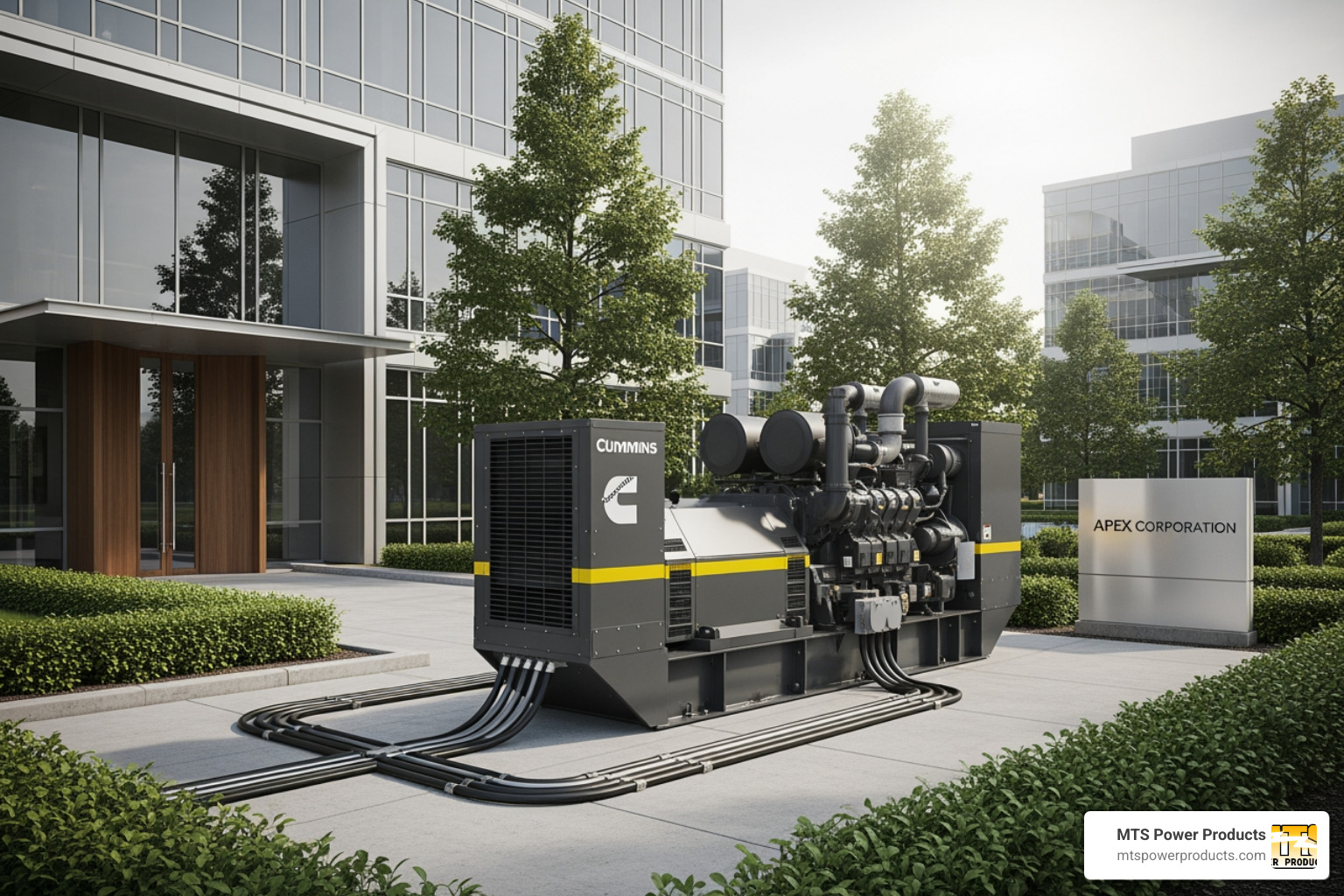
Buy Direct
from the Manufacturer
Sell our Products
Become a Distributor
Discounts
on volume purchases
Visit Us
at our Miami office
from the Manufacturer
Become a Distributor
on volume purchases
at our Miami office
Generator installation Miami services are available from multiple licensed contractors who can provide turnkey solutions from $3,000-$6,000 for residential installations, with projects typically taking 4-8 weeks from consultation to completion. Professional installation includes permits, site preparation, concrete pad installation, electrical connections, and final inspections.
Here’s what you need to know about generator installation in Miami:
| Installation Step | Timeline | What to Expect |
|---|---|---|
| Initial Consultation | 1-2 days | Site survey, power needs assessment |
| Permitting | 2-4 weeks | Miami-Dade permits, HOA approvals if applicable |
| Installation | 1-3 days | Concrete pad, generator placement, connections |
| Inspection | 1-2 days | Final inspection and system testing |
| Total Process | 4-8 weeks | From consultation to operational system |
Living in Miami means living with the reality of hurricane season and the power outages that come with it. Whether you’re protecting your family home or ensuring business continuity, a reliable backup generator isn’t just a convenience—it’s essential for safety and peace of mind.
“When the electricity shuts down—you can’t afford to have operations come to a grinding halt,” as one local generator installer puts it. This is especially true in South Florida, where our electrical infrastructure is frequently overwhelmed by storms, heat waves, and growing demand.
With over 30 years of combined industry experience, Miami’s generator installation professionals understand the unique challenges our climate presents. From flood zone considerations to hurricane-resistant mounting, local experts ensure your generator will perform when you need it most.
The investment in a quality generator installation pays dividends during every outage, keeping your air conditioning running, food preserved, medical devices operational, and security systems functioning—all critical during Miami’s storm season.
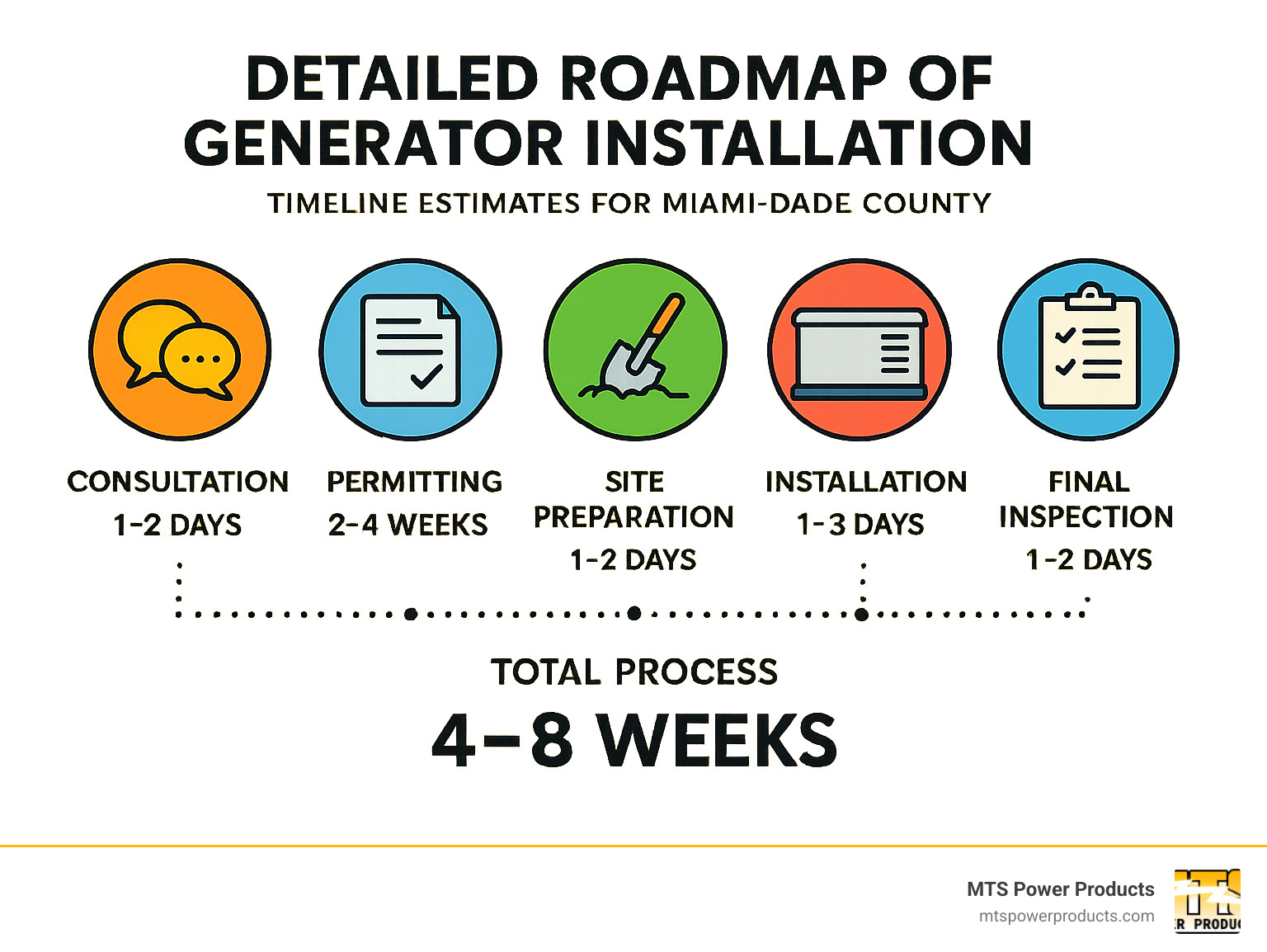
When the lights go out in Miami, it’s more than just an inconvenience – it’s a threat to our safety, comfort, and financial security. Miami residents face power outages that collectively cost American households $150 billion annually, and our unique coastal location puts us squarely in the crosshairs of hurricane season.
From June through November, we live with the constant possibility of extended blackouts. Even on sunny days, Miami’s aging electrical grid groans under the weight of our growing population and those famously scorching temperatures we all endure. The result? More frequent outages that leave us in the dark.
As our friends at MTS Power Products often remind customers: “Your home’s safety is guaranteed, regardless of the weather conditions outside. With Miami’s electrical infrastructure being overburdened, there’s a critical need for reliable backup power solutions.”
Looking at recent storm statistics, the need becomes even clearer. During major hurricanes, some neighborhoods have gone weeks without power restoration. That’s not just uncomfortable – it’s potentially dangerous.
Find more about Weather in Hialeah, FL
When Miami’s power grid fails, the consequences hit close to home:
Without air conditioning, indoor temperatures quickly soar to dangerous levels – especially threatening for seniors and those with health conditions. What many don’t realize is that humidity buildup can trigger mold growth in as little as 24-48 hours, creating a health hazard that lasts long after power returns.
That fully stocked refrigerator? During extended outages, you could lose thousands in food spoilage. After preparing for storm season, watching all that food go to waste feels especially frustrating.
For neighbors relying on medical devices, power outages become life-threatening within hours. Oxygen concentrators, CPAP machines, and medication refrigeration all depend on reliable electricity.
Your home’s security takes a hit too. Without power, alarm systems, cameras, and even electric garage doors may fail, leaving your property vulnerable precisely when emergency services are stretched thin.
And in classic Miami fashion, there’s the pool concern. As one local installer notes, “Generators preserve pool equipment function to prevent water from turning green during outages” – a particular headache in our tropical climate.
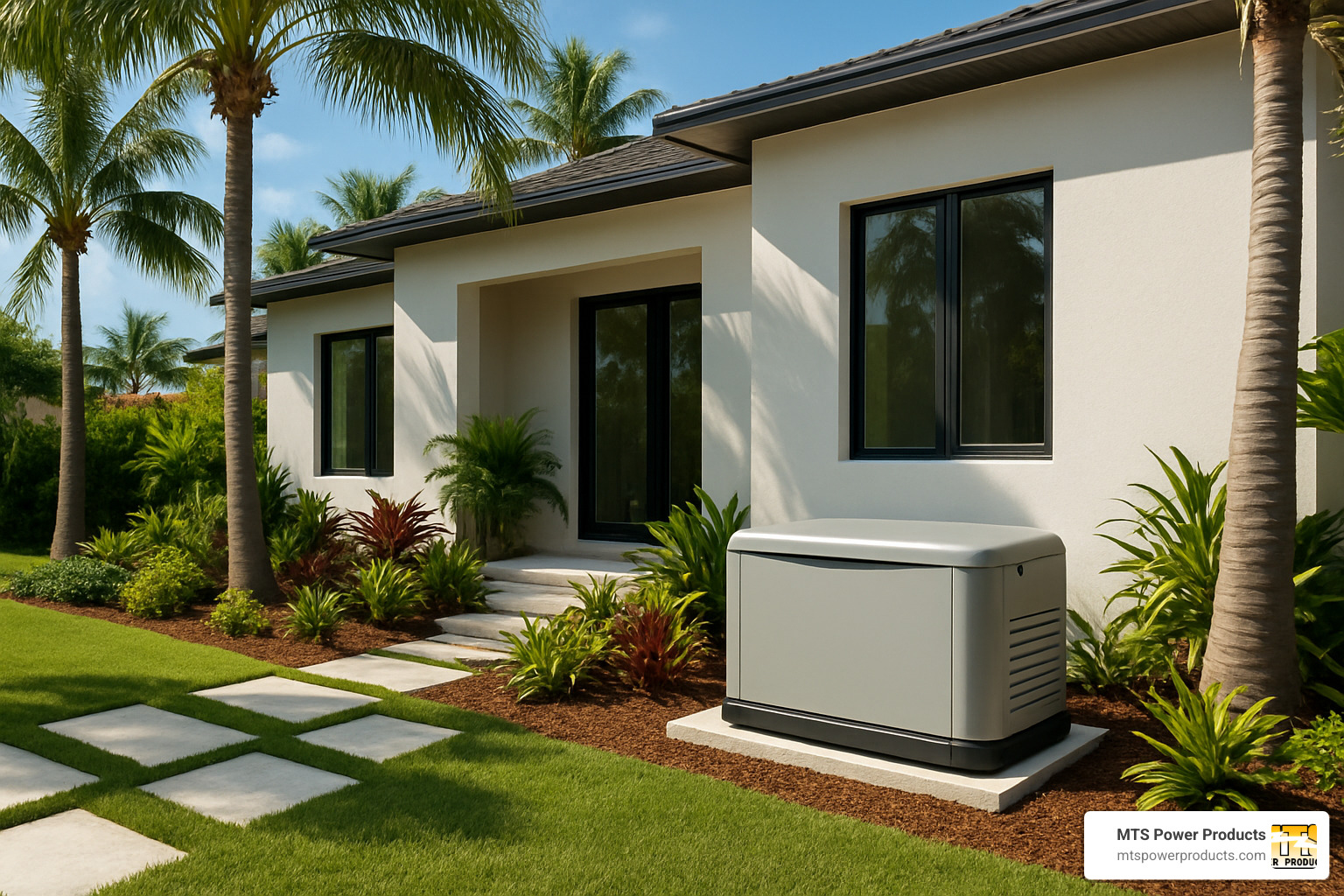
For Miami’s business community, power continuity isn’t just convenient – it’s essential for survival:
Revenue protection becomes critical during outages. Business continuity experts confirm that even a single day of closure can cost small businesses thousands in lost revenue – money that many local shops and restaurants simply can’t afford to lose.
Power surges and sudden outages can damage servers and lead to data loss, potentially erasing years of customer records and financial information. For businesses without proper backups, this can be devastating.
Restaurants, grocery stores, and pharmacies face massive inventory losses when refrigeration fails. One local restaurant owner told us they lost over $20,000 in food inventory during a recent three-day outage – a crushing blow for a small business.
Perhaps most importantly, businesses with backup power can continue serving customers when competitors cannot. This builds loyalty and reputation that lasts long after the lights come back on.
As one satisfied Miami business owner shared: “I recently used a local company for a generator project in my business located in Downtown Homestead and was extremely impressed with their level of professionalism. They were able to handle the permit process and scope of work in less than thirty days, which was a huge relief for me.”
At MTS Power Products, we understand that Miami’s unique challenges require specialized solutions. Whether you’re protecting your family home or ensuring business continuity, we provide the backup power systems that keep Miami running – even when the grid doesn’t.
When it comes to generator installation Miami residents have several important choices to make. Your backup power system needs to match your specific needs, budget, and property constraints. Let’s explore the options that will keep your lights on when storms roll in.
Picture this: the wind is howling, rain is pounding on your windows, and suddenly—darkness. In this moment, the difference between a portable and standby generator becomes crystal clear.
Portable generators are like the helpful neighbor who shows up during emergencies. They’re more affordable ($500-$2,000), can be moved where needed, and work well for powering essential items like refrigerators and a few lights. However, they require manual setup during storms (not fun in hurricane-force winds), must be refueled regularly, and absolutely need to be operated outdoors to prevent deadly carbon monoxide poisoning.
Standby generators, on the other hand, are like having a full-time security guard for your power needs. They’re permanently installed, kick on automatically when power fails, and can keep your entire home or business running. While they require a higher initial investment ($3,000-$20,000+ installed), their longer lifespan and peace of mind are worth every penny for many Miami residents.
“Whole-home standby generators are not used often, so it’s important to address repair needs quickly and keep them well-maintained so that they function when needed,” our team at MTS Power Products often reminds customers. This is especially true in Miami, where that generator might sit unused for months before suddenly becoming your lifeline during hurricane season.
Your generator’s fuel type is a crucial decision that affects how reliably it will perform when you need it most.
Natural gas connects directly to municipal supply lines, offering potentially unlimited runtime without the hassle of refueling. It burns cleaner than other options and requires no onsite storage. The catch? If severe storms damage gas lines, your unlimited supply suddenly becomes unavailable when you need it most.
Propane offers excellent reliability for South Florida homes. Stored in tanks on your property (typically 250-1,000 gallons), propane has an impressive shelf life of 10+ years and burns cleanly. You’ll need space for tank installation and periodic refilling, but many Miami homeowners appreciate the independence from municipal services during major storms.
Diesel shines in larger commercial applications thanks to its superior fuel efficiency and longer runtime per gallon. The trade-off is a shorter shelf life (12-24 months) and more maintenance to prevent fuel degradation in our humid climate.
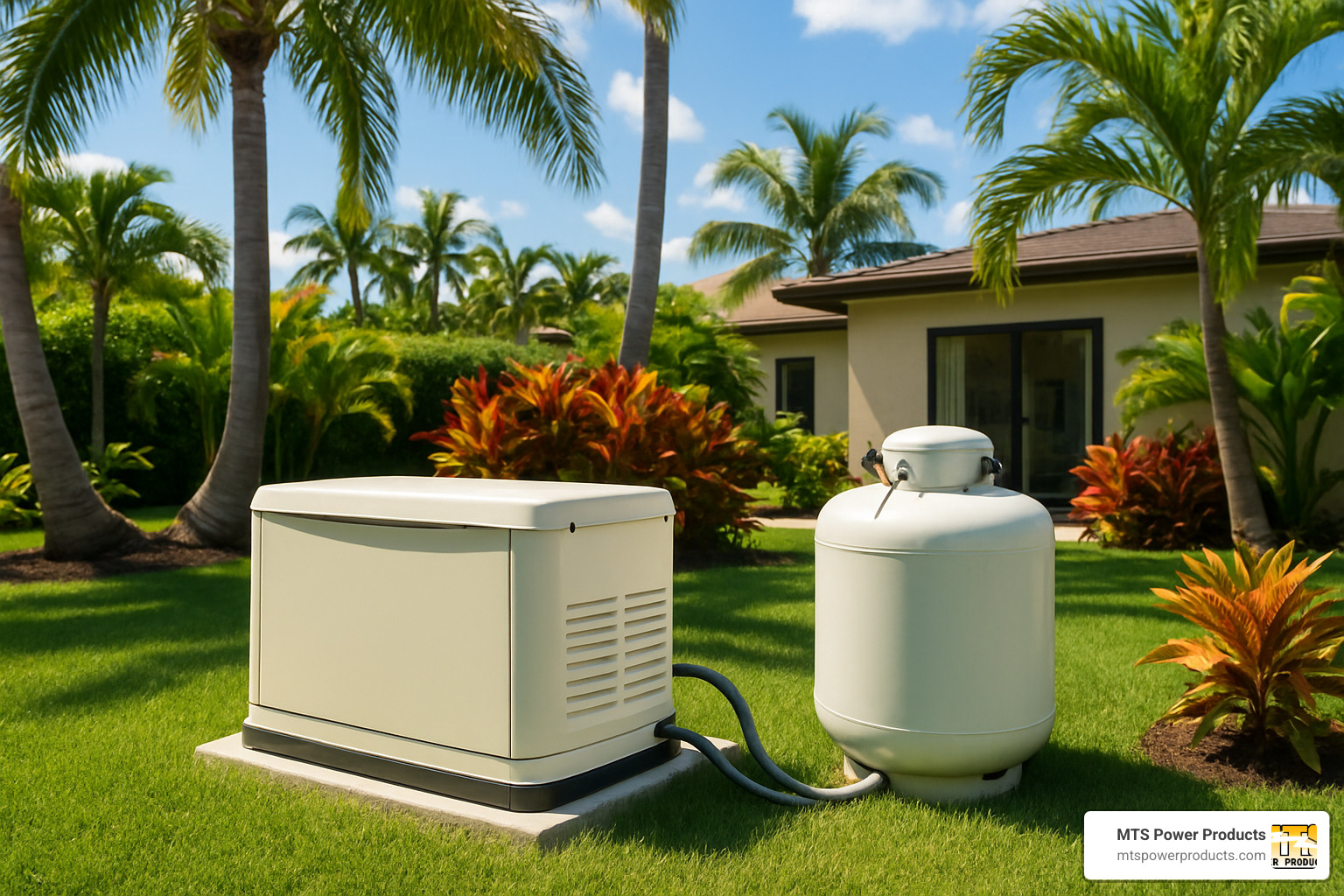
The transfer switch might not be the most exciting part of your generator system, but it’s absolutely critical. Think of it as the traffic controller that safely directs power from your generator to your home while preventing dangerous backfeeding into utility lines.
Manual transfer switches are more budget-friendly ($300-$700 plus installation) but require someone to physically flip the switch during an outage. As one local Miami electrician explains, “Manual transfer switches not only supply power but protect both electricians and home appliances from high voltage.” They’re typically paired with portable generators and work well for cost-conscious solutions.
Automatic transfer switches (ATS) are the premium option ($500-$2,000 plus installation) and worth every penny for the convenience they provide. These smart devices constantly monitor your utility power and seamlessly transfer to generator power within seconds of detecting an outage. When utility power returns, they automatically switch back. There’s no need to venture outside during a storm or middle-of-the-night outage.
At MTS Power Products, we take particular pride in our McPherson Controls—our own customized line of professional quality commercial and residential power controls. These advanced transfer switches feature remote monitoring capabilities and improved safety standards that prove invaluable during Miami’s unpredictable hurricane season. Since we’re centrally located near both Miami International Airport and the Port of Miami, we can quickly provide these essential components to keep your home or business powered when others go dark.
For more information on professional installation options, visit our Standby Generator Installation page or explore our Generator Control Panel Manufacturer offerings.
Finding that “just right” generator size is a bit like Goldilocks tasting porridge – you don’t want too small or too big when planning your Generator installation Miami project. An undersized generator will leave you in the dark when you need power most, while an oversized one is just burning through your hard-earned money and extra fuel.
Figuring out your power needs doesn’t have to be complicated. Start by walking through your home and making a list of what you absolutely can’t live without during an outage. Your refrigerator to keep food from spoiling? Definitely. That fancy margarita machine? Maybe not essential (though I won’t judge if you disagree!).
Once you’ve identified your must-haves, add up their running wattage – but here’s where many homeowners make a critical mistake. Many appliances, especially those with motors like your air conditioner or refrigerator, need a power “boost” to get started. This starting surge can be 3-4 times higher than their regular running wattage!
“I always tell my Miami customers to plan for the worst-case scenario,” says one of our technicians at MTS Power Products. “When that hurricane is bearing down, you’ll be grateful you didn’t cut corners on generator capacity.”
Don’t forget to think ahead, too. If you’re planning to add that home office or mother-in-law suite next year, factor those future needs into your calculations now. Our team can perform a detailed load analysis to make sure you get exactly the right size for your situation.
Here’s a real-world example for a typical Miami home:
| Appliance | Running Watts | Starting Watts |
|---|---|---|
| Central A/C (3-ton) | 3,500 | 10,500 |
| Refrigerator | 700 | 2,100 |
| Lights (10 fixtures) | 600 | 600 |
| TV/Electronics | 500 | 500 |
| Microwave | 1,000 | 1,000 |
| Well Pump | 1,000 | 3,000 |
| TOTAL | 7,300 | 17,700 |
Looking at these numbers, you’d need a generator that can handle at least 17,700 watts of surge power – which means you should be looking at a 20kW generator to be safe.
Living in Miami-Dade means dealing with some of the strictest building codes in the country – and for good reason! Our hurricane vulnerability means these regulations actually protect you and your investment.
For your Generator installation Miami project, you’ll need several permits and approvals. First, there’s the building permit for that concrete pad your generator will sit on. Then comes the electrical permit for all those connections that make the magic happen, and a gas permit if you’re hooking up to natural gas or propane.
Don’t forget about zoning approval – most Miami neighborhoods require generators to be at least 5 feet from property lines. And if you’ve ever been annoyed by a noisy neighbor, you’ll appreciate that Miami-Dade limits generator noise to 75 decibels at the property line.
Living in a flood zone? You’ll need to lift that concrete pad to specific heights. And if you’re in an HOA community – well, let’s just say they might have opinions about where you place your generator and how you screen it from view!
“They were able to handle the permit process and scope of work in less than thirty days, which was a huge relief for me,” shared one of our happy customers. At MTS Power Products, we take care of all this paperwork headache for you. We know the Miami-Dade system inside and out, ensuring your installation meets every code requirement without you having to become an overnight permitting expert.
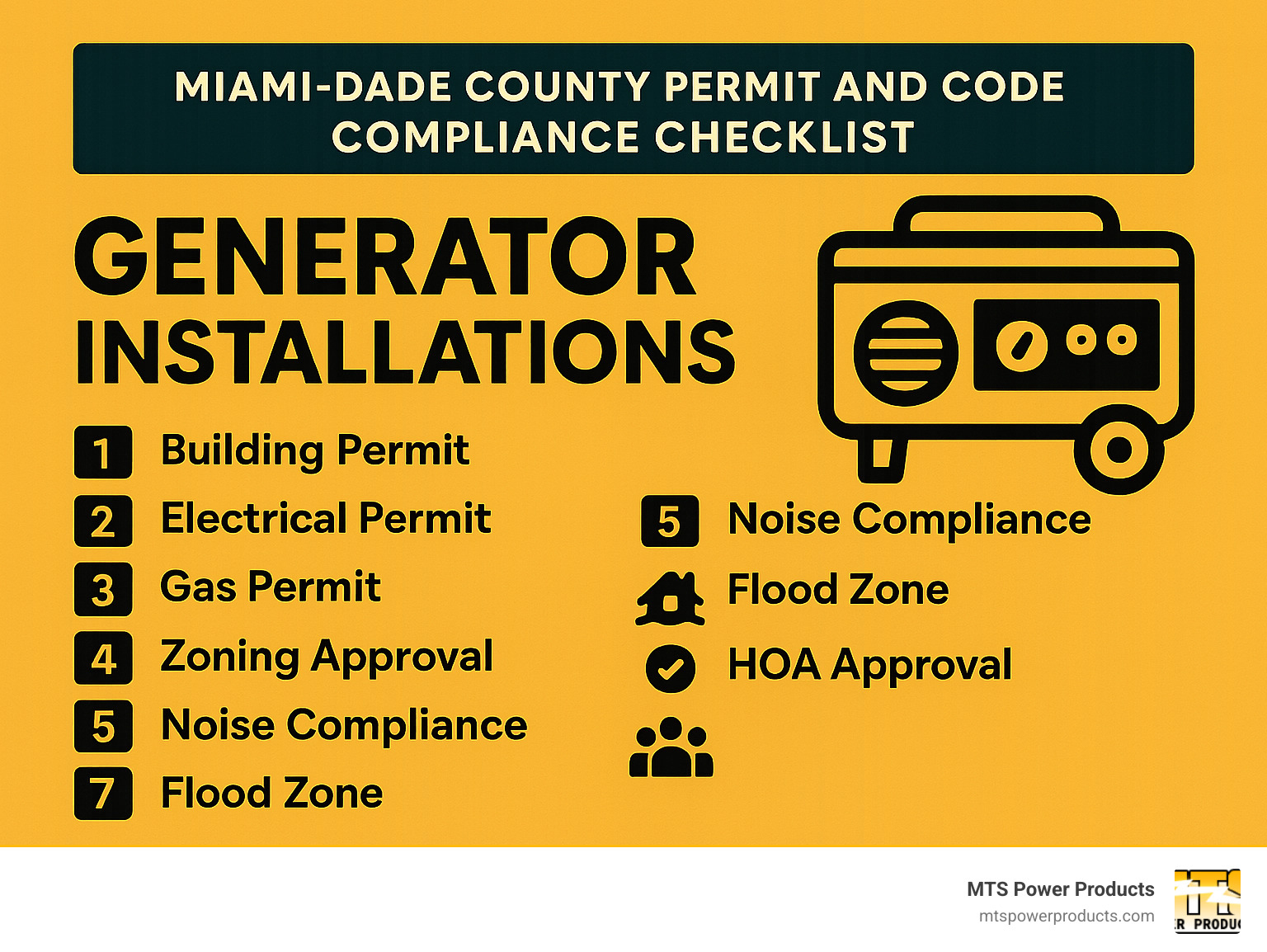
When you’re ready to explore backup power options for your home, our team at MTS Power Products is ready to guide you through the entire process. Check out our Backup Generator for Homes page for more details on residential solutions that will keep your family comfortable through Miami’s next power outage.
The journey to reliable backup power isn’t complicated when you understand what’s ahead. For most generator installation Miami projects, you’re looking at about 4-8 weeks from your first conversation to flipping that switch. Let’s walk through what this journey actually looks like for Miami homeowners.
It all starts with a friendly chat and site visit. Our team at MTS Power Products will walk your property, discuss your power needs, and help you understand your options. This initial consultation only takes a day or two, but it sets the foundation for everything that follows.
Next comes the planning phase, where we create detailed engineering drawings for your specific property. This typically takes 1-2 weeks as we carefully map out electrical connections, gas line specifications, and design a concrete pad that meets Miami-Dade’s strict flood zone requirements.
The permitting process is where patience comes in handy. Miami’s building department, electrical permits, and gas permits all need proper approval – and if you’re in an HOA community, they’ll need to sign off too. This step usually takes 2-4 weeks, but our team handles all the paperwork and follow-up so you don’t have to chase permits around town.
Once permits are in hand, things start moving quickly. Site preparation begins with excavation for your generator’s concrete pad and trenching for gas and electrical lines. This groundwork typically takes just a day or two.
The concrete pad itself is a critical component, especially in our hurricane-prone region. We’ll build forms, place rebar for strength, pour concrete, and then allow proper curing time – usually about 3-7 days before we can place heavy equipment on it.
When your generator arrives, our team will carefully position it on the pad, secure it properly, and then begin making all the necessary connections. The electrical hookup includes installing your transfer switch and connecting to your home’s electrical panel, while gas connections require precise pressure testing for safety.
“I watched them install my Generac last month, and I was impressed by how methodical they were with the testing,” one Miami Beach homeowner told us. “They ran the system through multiple power outage scenarios before they considered it complete.”
The final steps include comprehensive system testing and official inspections. We’ll demonstrate how everything works, walk you through basic maintenance, and ensure you understand your warranty coverage.
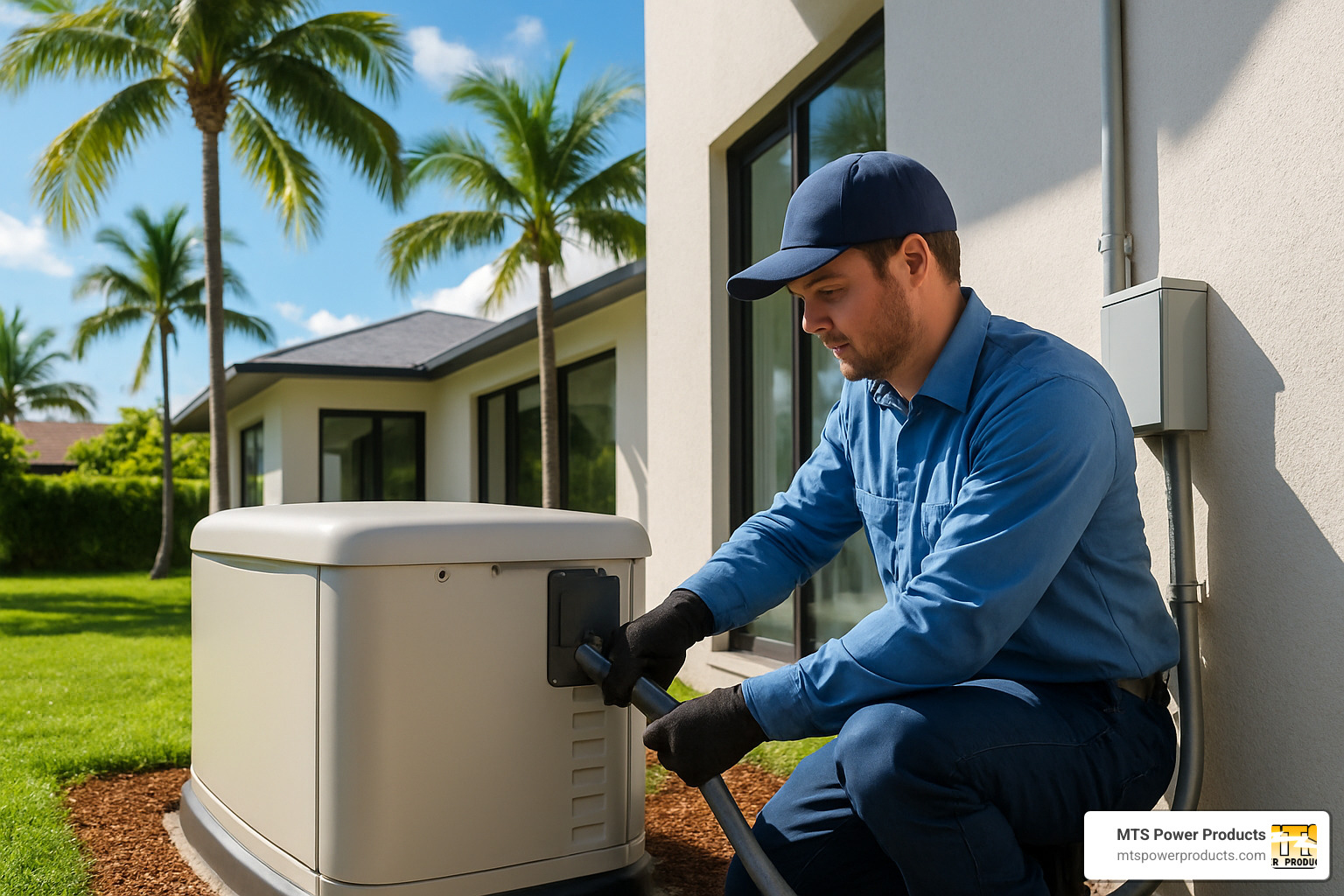
Let’s talk dollars and sense. A complete generator installation Miami project typically ranges from $8,000 to $20,000, depending on your specific needs. Larger homes with more power requirements will naturally fall toward the higher end of that spectrum.
What affects the price? Several factors come into play:
Many of our customers are pleasantly surprised to learn about the return on this investment. Beyond the obvious benefit of keeping your lights on during hurricane season, a properly installed generator can increase your property value by 3-5%. Some insurance companies even offer premium discounts for homes with backup power systems.
There’s also the hard-to-quantify value of avoiding losses during extended outages. When you add up potential hotel stays, spoiled food, damaged electronics from power surges, and lost work-from-home productivity, the generator often pays for itself during just one or two major outages.
At MTS Power Products, we understand that this is a significant investment for most families. That’s why we offer flexible financing options to make reliable backup power accessible to more Miami homeowners. Our payment plans let you spread the cost over time while still enjoying immediate protection from our unpredictable power grid.
As one of our Coral Gables customers recently put it: “The financing made it possible for us to get exactly what we needed instead of settling for something that wouldn’t power our whole house. Best decision we made before last hurricane season!”
Let’s face it—after your generator installation Miami project is complete, the last thing you want is to find your backup power system isn’t working when you need it most. That’s why proper maintenance isn’t just recommended—it’s essential.
Think of your generator like your car—regular check-ups keep it running smoothly when you need it. At MTS Power Products, we recommend a simple maintenance routine to ensure your investment remains protected.
For monthly owner checks, take a quick walk around your generator to look for visible leaks or damage. Check the oil level when the unit is cool, make sure you have enough fuel on hand, and if your generator doesn’t have an automatic exercise cycle, give it a brief test run.
Your annual professional service should be more comprehensive. This includes an oil and filter change, fresh air filters, and careful inspection of spark plugs. Our technicians will thoroughly test your battery, inspect the fuel system, run diagnostics on the control system, and examine your transfer switch. We’ll also conduct load bank testing to ensure your generator can handle its full rated capacity.
“The best time for your annual tune-up is right before hurricane season starts,” our service team always reminds customers. “This timing gives you peace of mind when those storm warnings start coming in.”
Your generator will often tell you when it needs attention—if you know what to listen for.
Is your generator struggling to start or shutting down unexpectedly? Are you hearing unusual noises or feeling strange vibrations during operation? These are clear calls for professional help.
Watch for warning signs like visible leaks (whether oil, fuel, or coolant), warning lights illuminated on your control panel, or failure to complete scheduled exercise cycles. If you notice smoke or unusual odors during operation, or if your generator seems unable to power everything it used to, it’s definitely time to call us.
“A generator that sits idle for more than six months is much more likely to develop issues,” explains our lead technician. “Just like a car that sits too long, generators need regular exercise to stay in good working condition.”
One advantage of our McPherson Controls systems is their sophisticated remote monitoring capability. These smart systems can detect potential problems and alert you before they become serious issues—especially valuable during hurricane season when service technicians are in high demand throughout Miami.
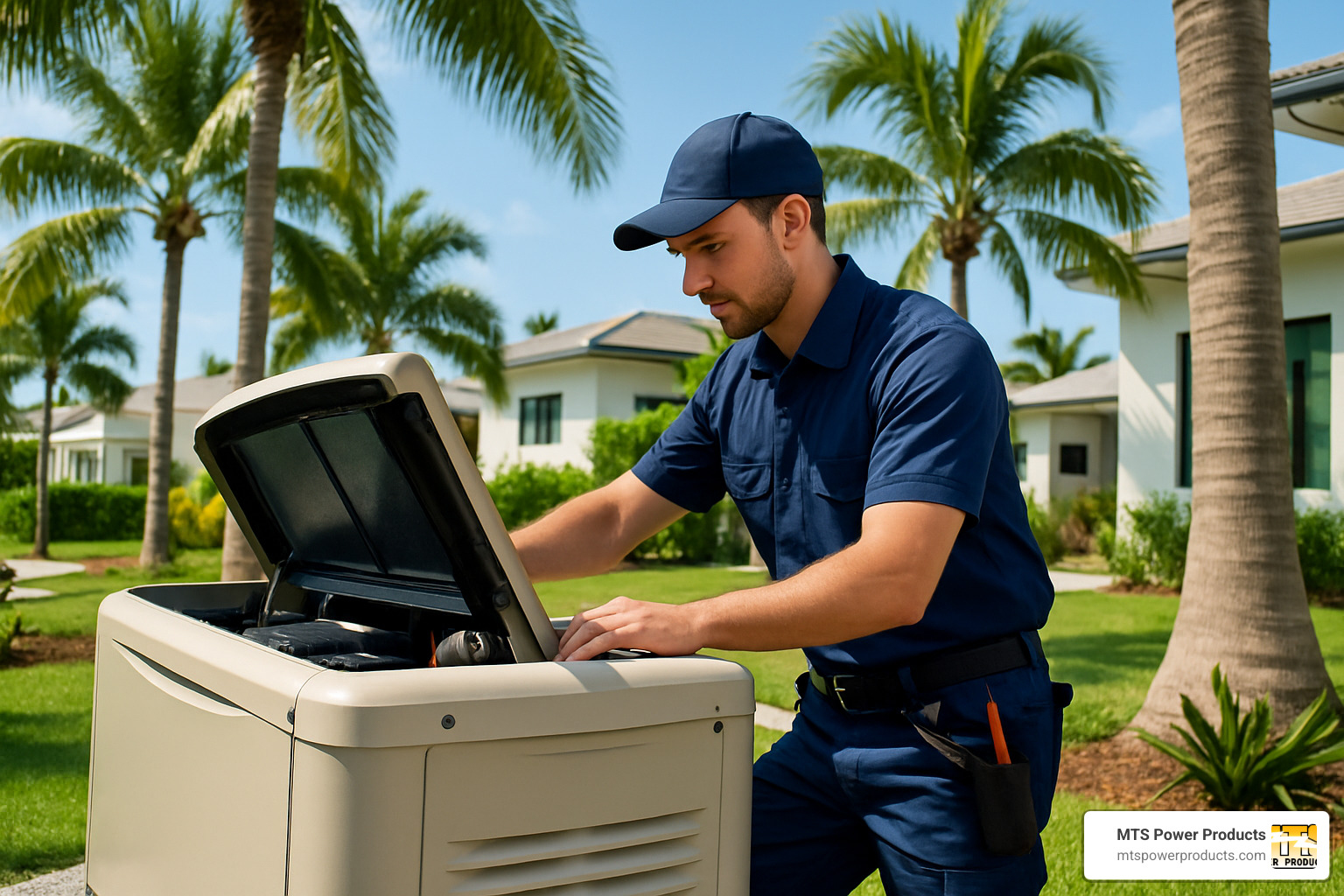
From the moment you say “yes” to when you can flip the switch, expect about 4-8 weeks. While the hands-on installation work only takes 3-5 days, most of that timeline is consumed by permitting and inspections. Miami-Dade County is thorough when it comes to power systems, and that’s actually a good thing for your safety.
While not technically required, an automatic transfer switch is like having insurance for when you’re not home. Imagine a storm knocks out power at 3 AM—do you want to fumble around in the dark with flashlights to start your generator? Automatic switches handle the transition seamlessly without you lifting a finger. For standby generators, these switches aren’t just convenient—they’re essential for proper operation.
I understand the appeal of DIY projects, but generator installation is one area where professional help isn’t just recommended—it’s crucial.
The safety risks alone should give any homeowner pause. Improper installation can lead to deadly carbon monoxide poisoning, electrical fires, or even electrocution. Beyond personal safety, there are strict code requirements in Miami-Dade County that DIY projects often miss, and you’ll need a licensed professional to pull the necessary permits.
Perhaps most importantly, DIY installation typically voids manufacturer warranties and may create issues with your homeowner’s insurance. As one of our customers wisely put it: “The money I might have saved doing it myself wouldn’t have covered even a day in the hospital.”
Modern standby generators are surprisingly quiet—about as loud as your central air conditioner (60-70 decibels) during normal operation. Miami-Dade County limits generator noise to 75 decibels at your property line, and properly installed units typically meet this requirement without additional sound barriers. Your neighbors might not even notice it’s running!
At minimum, schedule one professional service annually, ideally before hurricane season begins in June. Between these visits, monthly visual checks take just a few minutes but can catch potential issues early. Many of our customers choose our comprehensive maintenance plans for complete peace of mind, knowing their system will be ready when storm clouds gather.
Your fuel consumption depends on both your generator size and how much of its capacity you’re using. As a helpful reference:
A 20kW natural gas generator running at full power uses about 245 cubic feet per hour, while the same size propane generator consumes approximately 3.3 gallons per hour. If you opt for diesel, expect roughly 1.6 gallons per hour at full capacity.
The good news? Most residential generators rarely run at full capacity, which significantly reduces these consumption rates. During your consultation, we can provide more precise estimates based on your specific power needs and generator selection.
At MTS Power Products, we don’t just install and leave—we’re your partners in power security for the life of your system. When Miami’s skies darken with storm clouds, you’ll be glad to have both a reliable generator and a reliable service team just a phone call away.
When it comes to generator installation Miami residents need a reliable partner who truly understands our unique climate challenges. That’s where MTS Power Products shines – we bring over three decades of combined experience to your doorstep, ensuring your home or business stays powered through even the most severe weather events.
As a Miami-based manufacturer and provider of generator sets, parts, automatic transfer switches, and various electrical products, we offer something special: direct access to professional-quality power solutions without the middleman markup. Our custom line of McPherson Controls features the advanced remote monitoring capabilities modern homeowners want, with the improved safety standards Miami’s challenging environment demands.
“We don’t just sell generators – we provide peace of mind during hurricane season,” is a philosophy that guides everything we do at MTS Power Products.
Our strategic location minutes from Miami International Airport and the Port of Miami isn’t just convenient – it allows us to provide remarkably responsive service throughout South Florida while maintaining our worldwide delivery capabilities. Whether you need a compact residential system or a massive commercial installation, we’re uniquely positioned to help.
From your first consultation call to the final inspection and beyond, we handle every aspect of your generator journey. Our turnkey approach means you don’t have to coordinate between different contractors or steer complex permitting requirements alone – we’ve got you covered every step of the way.
Don’t wait until the weather forecast turns ominous to think about backup power. In South Florida, storm preparation is a year-round necessity, not a seasonal consideration. Contact MTS Power Products today to schedule your consultation and take the first meaningful step toward true power security.
In Miami, a reliable generator isn’t a luxury or an afterthought – it’s an essential component of responsible homeownership and business management. Let us help you weather whatever storms come your way with confidence and comfort.